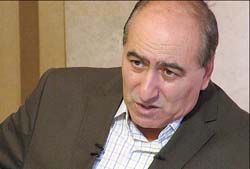The Mojahedin-e Khalq Organization (MKO also known as the MEK, PMOI and NCR) acted in full
 |
| MKO Ringleader’s Translator Confirms Group’s Key Role in Suppressing Iraqis |
subordination to Iraq’s security services during the era of former dictator Saddam Hussein and played a key role in the massacre of Shiites and Kurds during Iraq’s Intifada in 1991, a defected member said.
"The Organization collaborated (with the Saddam-era Iraqi forces) in the suppression of the Iraqi Intifada in 1991, in which the Kurds in Kurdistan and the Shiites in Southern Iraq were massacred," Ghorbanabli Hosseinnejad, a highly trusted veteran member of the MKO and the special interpreter of MKO ringleader Massoud Rajavi in talks with Iraqi government officials during Saddam’s era, disclosed in an interview with FNA on Monday.
He confirmed that the group acted as Saddam’s extra military wing for conducting terrorist  operations and kidnappings in Iraq.
operations and kidnappings in Iraq.
Hosseinnejad also revealed that the cult-like group has carried out numerous terrorist operations along the Iranian borders and within the country, a number of which were in Tehran.
The MKO is behind a slew of assassinations and bombings inside Iran, a number of EU parliamentarians said in a recent letter in which they slammed a British court decision to remove the MKO from the British terror list. The EU officials also added that the group has no public support within Iran because of their role in helping Saddam Hussein in the Iraqi imposed war on Iran (1980-1988).
Many of the MKO members abandoned the terrorist organization while most of those still remaining in the group are said to be willing to quit but are under pressure and torture not to do so.
A May 2005 Human Rights Watch report accused the MKO of running prison camps in Iraq and committing human rights violations.
According to the Human Rights Watch report, the outlawed group puts defectors under torture and jail terms.
The group, founded in the 1960s, blended elements of Islamism and Stalinism and participated in the overthrow of the US-backed Shah of Iran in 1979. Ahead of the revolution, the MKO conducted attacks and assassinations against both Iranian and Western targets.
The group started assassination of the citizens and officials after the revolution in a bid to take control of the newly established Islamic Republic. It killed several of Iran’s new leaders in the early years after the revolution, including the then President, Mohammad Ali Rajayee, Prime Minister, Mohammad Javad Bahonar and the Judiciary Chief, Mohammad Hossein Beheshti who were killed in bomb attacks by MKO members in 1981.
The group fled to Iraq in 1986, where it was protected by Saddam Hussein and where it helped the Iraqi dictator suppress Shiite and Kurd uprisings in the country.
The terrorist group joined Saddam’s army during the Iraqi imposed war on Iran (1980-1988) and helped Saddam and killed thousands of Iranian civilians and soldiers during the US-backed Iraqi imposed war on Iran.
Since the 2003 US invasion of Iraq, the group, which now adheres to a pro-free-market philosophy, has been strongly backed by neo-conservatives in the United States, who argued for the MKO to be taken off the US terror list.
The US formally removed the MKO from its list of terror organizations in early September, one week after Secretary of State Hillary Clinton sent the US Congress a classified communication about the move. The decision made by Clinton enabled the group to have its assets under US jurisdiction unfrozen and do business with American entities, the State Department said in a statement at the time.
In September 2012, the last groups of the MKO terrorists left Camp Ashraf, their main training center in Iraq’s Diyala province. They have been transferred to Camp Liberty which lies Northeast of the Baghdad International Airport.
Camp Liberty is a transient settlement facility and a last station for the MKO in Iraq.
